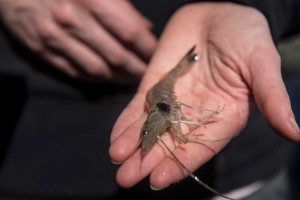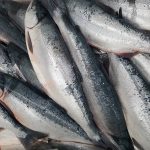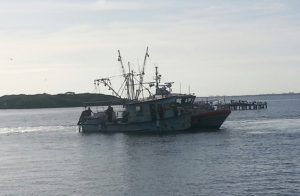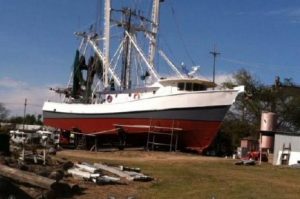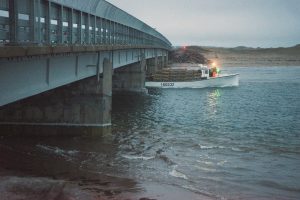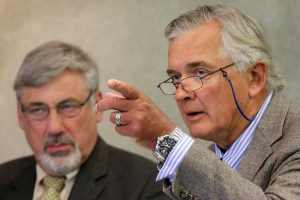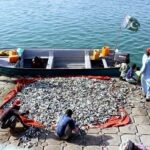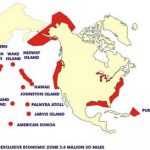Tag Archives: Pew
The Adventures of $uper Ecoman – Contemplation
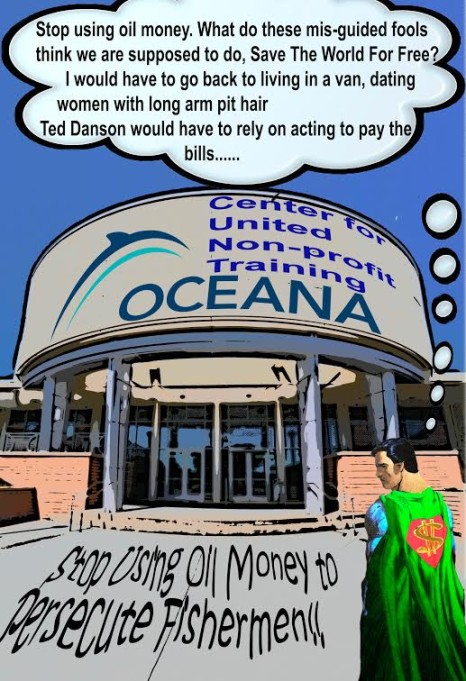 Flashing across the sky is a blinding streak of Blue, Green and Gold. A split second later, $uper Ecoman arrives at his destination, The Center for United Non Profit Training, and he is shocked. Not because of the unexpected, but the sudden thought of a world without the Eco Fuel that keeps he, and his army of paid eco crusaders alive, Wealth Foundation Funding. Click here 16:02
Flashing across the sky is a blinding streak of Blue, Green and Gold. A split second later, $uper Ecoman arrives at his destination, The Center for United Non Profit Training, and he is shocked. Not because of the unexpected, but the sudden thought of a world without the Eco Fuel that keeps he, and his army of paid eco crusaders alive, Wealth Foundation Funding. Click here 16:02
Council For Sustainable Fishing – Help get the best qualified fisheries managers
 Good news from last week: Governors Nikki Haley and Rick Scott nominated charter boat operators Mark Brown from Charleston and Robert Johnson from St. Augustine respectively for appointment to the South Atlantic Fishery Management Council to fill seats for recreational/for-hire representation. Read more here 17:19
Good news from last week: Governors Nikki Haley and Rick Scott nominated charter boat operators Mark Brown from Charleston and Robert Johnson from St. Augustine respectively for appointment to the South Atlantic Fishery Management Council to fill seats for recreational/for-hire representation. Read more here 17:19
Price of bluefin tuna nosedives at Tokyo auction – Dramatic Pew statement- “You have to wonder what the last fish is going to cost,”
 TOKYO — Sushi restaurateur Kiyoshi Kimura paid 7.36 million yen (about $70,000) for a 230-kilogram bluefin tuna in the year’s celebratory first auction at Tokyo’s Tsukiji market on Sunday, just five per cent of what he paid a year earlier despite signs that the species is in serious decline. Read more@therecord 12:27
TOKYO — Sushi restaurateur Kiyoshi Kimura paid 7.36 million yen (about $70,000) for a 230-kilogram bluefin tuna in the year’s celebratory first auction at Tokyo’s Tsukiji market on Sunday, just five per cent of what he paid a year earlier despite signs that the species is in serious decline. Read more@therecord 12:27
Fished out – Atlantic fishing nations fail to act to protect tuna and sharks.
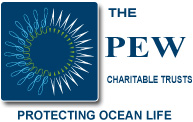 The ICCAT nations did maintain catch limits on Atlantic bluefin tuna. They also announced steps to force large fishing vessels to carry a unique identification number beginning in 2016, after many cases of illegal fishing off West Africa, with ships often changing names and flags in order to evade sanctions over illegal fishing. “Sharks is where they really dropped the ball,” said Elizabeth Wilson, director of the Pew Charitable Trusts’ international ocean policy unit, which had observer status at the gathering. “There was very little discussion about sharks. They barely even talked about it in their meetings, which is very disappointing,” she said in a phone interview after the meeting ended. more@thestar 10:22
The ICCAT nations did maintain catch limits on Atlantic bluefin tuna. They also announced steps to force large fishing vessels to carry a unique identification number beginning in 2016, after many cases of illegal fishing off West Africa, with ships often changing names and flags in order to evade sanctions over illegal fishing. “Sharks is where they really dropped the ball,” said Elizabeth Wilson, director of the Pew Charitable Trusts’ international ocean policy unit, which had observer status at the gathering. “There was very little discussion about sharks. They barely even talked about it in their meetings, which is very disappointing,” she said in a phone interview after the meeting ended. more@thestar 10:22
Letter: Report shows flaws in NOAA, Pew stands by Carmine Gorga, Gloucester, Ma
![]() I have heard it so many times, that I call it the Pew Mantra. What is the evidence that organization’s environmentalists offer to prove that family fishing vessels engage in overfishing? What are the “facts” on which they build their case? Well, this is what they tell us: At each passing, bottom trawlers scrape the floor of the ocean and, just like clear-cutting forests, make a desert out of it. Sounds so convincing doesn’t it? more@GDT 04:23
I have heard it so many times, that I call it the Pew Mantra. What is the evidence that organization’s environmentalists offer to prove that family fishing vessels engage in overfishing? What are the “facts” on which they build their case? Well, this is what they tell us: At each passing, bottom trawlers scrape the floor of the ocean and, just like clear-cutting forests, make a desert out of it. Sounds so convincing doesn’t it? more@GDT 04:23
Climate change changing Gulf of Maine fisheries
 The cod fishery appeared limitless and its value to Europe helped settle and enrich New England and Eastern Canada. Now the much smaller cod that survive are embattled by years of overfishing and other pressures. One of the major pressures is climate change. more@gomtimes 09:53 Plenty of ENGO anecdotes, and climate denialism! “Climate, while important, was not the primary reason for the collapse of cod,” “We did that. We mismanaged our ecosystem. We made that mess.” Tom Dempsey
The cod fishery appeared limitless and its value to Europe helped settle and enrich New England and Eastern Canada. Now the much smaller cod that survive are embattled by years of overfishing and other pressures. One of the major pressures is climate change. more@gomtimes 09:53 Plenty of ENGO anecdotes, and climate denialism! “Climate, while important, was not the primary reason for the collapse of cod,” “We did that. We mismanaged our ecosystem. We made that mess.” Tom Dempsey
There is not a cod collapse. There IS a cod exodus. Canada is being enriched once again, and they look at it as a cod crisis threatening the shrimp and crab they prefer to catch, based on landing value, as flat earthers like Dempsey, Bullard, and Crockett expose themselves as out of touch, preferring to continue the charade of failed fishery management that they are involved with! Tragic.
Fisherman Survival, Perverted ENGO Logic, and another NOAA/NMFS Fumble. Plan to reopen New England fishing spots debated
BOSTON (AP) – A plan to allow certain New England fishermen back into fishing grounds where they’ve long been banned was so objectionable to environmentalists that two groups sued to kill it months before it was officially released. And after the proposal was unveiled last week, fishermen who once backed the idea called the plan a useless gesture that does nothing for their struggling industry. None of the criticism surprises the Northeast’s top fishing regulator, John Bullard. But he says it doesn’t mean the proposal to reopen 3,000 square miles of Atlantic Ocean can’t work. “We recognize it’s probably not going to make anyone happy,” Bullard said. But, he added, “We think it’s a responsible way to make abundant stocks accessible to people.” continued@myfoxboston
Nils Stolpe: A staggering loss to U.S. fishermen and U.S. seafood consumers. And while on the subject of press releases…. CLF and Earthjusice
 It was back in June of 2008 that I first became aware of Richard Gaines’ work in the Gloucester Times in a three part series exploring the interplay between fishermen, feds, ENGOs and the mega-foundations that funded them in a controversial move to close Stellwagen Bank to fishing (see http://tinyurl.com/n8m3voh for the first installment). A letter about the series I wrote to Times Editor Ray Lamont started “kudos to Richard Gaines for reporting what is going on behind the smoke and mirrors obscuring the struggle to maintain the historical fisheries that have thrived on Stellwagan Bank for generations. He couldn’t be more on-target when writing ‘Pew is associated with public information campaigns against fishing and fish consumption.’” continued@thewritingsofnilsstolpe
It was back in June of 2008 that I first became aware of Richard Gaines’ work in the Gloucester Times in a three part series exploring the interplay between fishermen, feds, ENGOs and the mega-foundations that funded them in a controversial move to close Stellwagen Bank to fishing (see http://tinyurl.com/n8m3voh for the first installment). A letter about the series I wrote to Times Editor Ray Lamont started “kudos to Richard Gaines for reporting what is going on behind the smoke and mirrors obscuring the struggle to maintain the historical fisheries that have thrived on Stellwagan Bank for generations. He couldn’t be more on-target when writing ‘Pew is associated with public information campaigns against fishing and fish consumption.’” continued@thewritingsofnilsstolpe
Ahead of Bluefin Tuna Meeting, Congress, Industry urge NOAA to support U.S. interests; Scientists call Pew Trust “factsheet” a distortion
WASHINGTON (Saving Seafood) June 25, 2013 — On June 26, the International Commission for the Conservation of Atlantic Tunas (ICCAT) will convene in Montreal to discuss the stock assessment for Atlantic bluefin tuna. In adv![]() ance of the meeting, a debate has arisen among marine scientists, environmental groups, and industry stakeholders over the appropriate level of allowable bluefin harvest. This debate revolves around several unresolved scientific questions about the nature of the bluefin stock. How those questions are addressed at the Montreal meeting will impact how the international bluefin quota is set. continued@savingseafood
ance of the meeting, a debate has arisen among marine scientists, environmental groups, and industry stakeholders over the appropriate level of allowable bluefin harvest. This debate revolves around several unresolved scientific questions about the nature of the bluefin stock. How those questions are addressed at the Montreal meeting will impact how the international bluefin quota is set. continued@savingseafood
Big Tuna News. Pew: Best Available Science? Credible Scientists in the Field label it an “irresponsible distortion”
Pew: The Best Available Science on Western Atlantic Bluefin Tuna Read it here
Four leading scientists with expertise in large pelagics call Pew Bluefin Tuna fact sheet an “irresponsible distortion” Read it here
Ten lawmakers urge NOAA negotiator to seek increase in U.S. Atlantic Bluefin Tuna quota within ICCAT scientific advice read it here
Pew gears up for Blue Fin Tuna fight with ICCAT over Catch Quota’s with working group meeting in Montreal, June 26 to 28
This week, fisheries managers and scientists from around the world will meet in Canada and shape the fate of the western Atlantic bluefin tuna, signaling whether fishery managers will choose to follow sound science and let this tuna population recover or ignore precaution and return to crippling levels of overfishing. The latter could result in the collapse of the western Atlantic bluefin population. continued@pew
Fisherynation.com Editorial: The Great Atlantic Sturgeon Debacle
![]() This Sturgeon debacle should serve as a pretty clear indication of how our fisheries “management” system works, or more to the point, how it doesn’t work.
This Sturgeon debacle should serve as a pretty clear indication of how our fisheries “management” system works, or more to the point, how it doesn’t work.
How, by any stretch of regulation protocol, methodology, or just plain ol’ administrative integrity, can NOAA declare a species to be endangered without an assessment? Perhaps NOAA’s luminous legal department, Lois Schiffer, could give us the “legal” justification,,,continued
Fishing interests begin to map strategy with joint meeting of the Mayor’s Ocean and Fisheries Council / Federal Fishing Advisory Board.
NEW BEDFORD — When fisheries regulation gets a makeover in the next year or two, the New England fishery intends to get into the debate early to impress on regulators how badly served the region has been under existing rules.![]() That was the theme struck by Mayor Jon Mitchell Monday as he co-chaired a joint meeting of the Mayor’s Ocean and Fisheries Council with Rep. William Keating, D-Mass., representing the Federal Fishing Advisory Board. continued
That was the theme struck by Mayor Jon Mitchell Monday as he co-chaired a joint meeting of the Mayor’s Ocean and Fisheries Council with Rep. William Keating, D-Mass., representing the Federal Fishing Advisory Board. continued
Fishermen questioning plan to open new areas
The proposal would open up portions of protected sections of the Gulf of Maine to commercial fishing. The plan is facing stiff opposition from parts of the fishing industry, environmentalists and conservationists. ![]() continued
continued
Insight: Comeback cod lessens gloom over emptying oceans
 Just over six years ago, an article in the U.S. journal Science projected that all fish and seafood species, on current trends, would collapse by 2048. Read more here
Just over six years ago, an article in the U.S. journal Science projected that all fish and seafood species, on current trends, would collapse by 2048. Read more here
Closed Areas need fed’s OK to open
 The New England Fishery Management Council has voted to recommend giving commercial groundfishermen access to parts of five areas that have been closed to them for many years. The request to open closed areas to commercial fishing came days before the NOAA Science Center issued a report on the 2011 fishing year that contained the revelation that only 41 percent of allocated fish were landed in 2011. Read More
The New England Fishery Management Council has voted to recommend giving commercial groundfishermen access to parts of five areas that have been closed to them for many years. The request to open closed areas to commercial fishing came days before the NOAA Science Center issued a report on the 2011 fishing year that contained the revelation that only 41 percent of allocated fish were landed in 2011. Read More
U.S. Reopens Waters Off New England for Fishing – NYT
Jud Crawford, the science and policy manager for the Pew Environment Group’s Northeast Fisheries program, said the decision to reopen protected waters could have dire consequences. “One of the concerns is that we will very quickly lose some very important breeding stock in these places,” Mr. Crawford said. The council’s vote is subject to approval by the National Oceanic and Atmospheric Administration’s Fisheries Program, which is expected to act by May. Read More
Fisherynation Editorial – The Politcal Purging of Dr. Brian Rothschild. What is the Real Reason?
 Dr. Brian Rothschild a world-renown fisheries researcher and author, Dean Emeritus of Marine Fisheries Institute, has been removed from his co-directorship of the Institute which he founded and developed over the past ten years. This move by the UMass president’s office will place the Institute under the control of the president’s office and the Institute’s co-directorship will go to the current School of Marine Science and Technology Dean, Dr. Steve Lohrenz, a champion of President’s Obama’s controversial National Ocean Policy and a former Vice-Chair of the Consortium for Ocean Leadership which partners with Integrated Ocean Drilling Program (a program devoted to deep ocean geology exploration associated with oil and gas production) .
Dr. Brian Rothschild a world-renown fisheries researcher and author, Dean Emeritus of Marine Fisheries Institute, has been removed from his co-directorship of the Institute which he founded and developed over the past ten years. This move by the UMass president’s office will place the Institute under the control of the president’s office and the Institute’s co-directorship will go to the current School of Marine Science and Technology Dean, Dr. Steve Lohrenz, a champion of President’s Obama’s controversial National Ocean Policy and a former Vice-Chair of the Consortium for Ocean Leadership which partners with Integrated Ocean Drilling Program (a program devoted to deep ocean geology exploration associated with oil and gas production) .
The stated reasons for Brian Rothschild’s removal are at best flimsy and at worst they are a Kafkaesque rationale for a political purge.
“… it lacked an oversight board, a budget and annual reports and it wasn’t coordinated well enough to solicit research grants from industry, government and other institutions, said university spokesman John Hoey.”
Really? After ten successful years this Marine Fisheries Institute now isn’t coordinated well enough to get research grants? Grants coming from industry, government, and OTHER INSTITUTIONS. Now who might they be? Could it be Pew or perhaps EDF/CLF/NOAA or the Dept. of the Interior?
Dr. Rothchild’s professional status now, for some reason, isn’t high enough to be co-director of the Institute he founded and has been dean of for many years?
“It’s appropriate that the co-director needs to be a dean or someone of that administrative level,” he [Hoey] said.
Brian Rothschild has forgotten more about fisheries science than entire science departments at government and “other institutions” will ever know. He has used integrity and common sense in his work (rare commodities in the circus of fisheries science). He has benefited fishing enormously, keeping this vital local clean-food producing industry from the clutches of the ignorant faux science of self-serving bureaucrats and corrupt plutocracy-spawned NGO’s.
Dr. Brian J. Rothschild, Dean of the School for Marine Science and Technology (SMAST) of the University of Massachusetts at Dartmouth, has been presented with the 2011 Oscar Elton Sette Award.
That would seem to qualify Brian Rothschild as “…a dean or someone of that level”, wouldn’t it?
Soas the nuisance local fishing industry is systematically dismantled to make way for the energy industry’s March Into The Sea, it is no surprise that one of the fishing industry’s most enlightened intellectuals would be removed and the Institute that he brought to prominence revamped.
Guest View: Strong action on menhaden best for coastal economy and ecology – Peter Baker – Pew Environment Group.
Unfortunately, a recent guest commentary in this paper (“Guest View: Menhaden fishery needs reasonable — not drastic — action,” Nov. 7) presented an outdated picture of the science about this fish and a false choice between protecting menhaden and jobs. In fact, sound science supports bold action on menhaden to benefit both our coastal ecosystem and economy.http://www.southcoasttoday.com/apps/pbcs.dll/article?AID=/20121203/OPINION/212030322
Fishermen hope legislation benefits industry. Charlston Huckster wearing a cheap rug strokes’ em with Pew Lotion!
Locals in the fishing industry, including Baumann, hope the research could lead to further regulatory change to the Magnuson-Stevens Act which sets catch limits designed to prevent overfishing, but also has fishermen stuck at the docks.J. Dean Foster, with Foster Associates, a marketing group based in Charleston, said the congressional committee likely will debate the bill early next year. Foster is working with Pew Environment Group to drum up support for the bill http://www.myrtlebeachonline.com/2012/11/26/3190554/fishermen-hope-legislation-benefits.html or the bill http://www.myrtlebeachonline.com/2012/11/26/3190554/fishermen-hope-legislation-benefits.html
or the bill http://www.myrtlebeachonline.com/2012/11/26/3190554/fishermen-hope-legislation-benefits.html
The Pew Dog and Greenpeace’s anti-Sealord spoof.
My friend, jj the fisherman, is very creative, and a pretty smart SOB. He creates legitimate satire. You will find plenty more at his column. Click show more to find it all. Lots of photo and great articles. http://jjthefisherman.newsvine.com/
It appears that Greenpiece finds it a legitimate method of communicating their anti fishing view, of which ending fishing would probably find them destitute, as it is apparent they are on a path of unsustainability by over-exploiting fishermen!
The greedy ENGOs just don’t understand their greed to hunt the last fisherman to extinction will cause an unprecedented collapse of their bread and butter revenue raising target.
Rage erupts over Greenpeace’s anti-Sealord spoof
“Satire has long been used as a way of getting messages across. We’re not criticising the workers that feature in this ad. Those in the fishing industry here and in the Pacific deserve to have a future in the fishing industry, and they’re entitled to make a living from the sea, but Sealord itself is putting that at risk by its destructive catch methods,” he affirmed. Read More.
http://fis.com/fis/worldnews/worldnews.asp?l=e&ndb=1&id=55853

PEW ENVIRONMENT: Historic Moment for Menhaden – Spreading the Fertilizer
The following was published by Lee Crockett, the Director of US Fisheries Campaigns for the Pew Environment Group. http://www.huffingtonpost.com/lee-crockett/the-bottom-line-historic-_b_1932301.html
Analysis: Warning of a “depleted” menhaden stock and a population that has “plunged nearly 90 percent over the past 25 years,” Lee Crockett, Pew Environment Group’s Director of US Fisheries Campaigns, paints a bleak picture of the current Atlantic menhaden population. But, by leaving out several important pieces of information, Crockett’s portrait is exaggerated and one-sided. Along with a similarly misleading petition from Northeast Fisheries Program Director Peter Baker, Pew’s most recent op-ed is part of a continuing pattern of selectively omitting relevant facts about menhaden. Examining these omitted facts reveals a situation that is much less dire than Pew suggests.
Crisis highlights running dispute over US fish law
Jay Lindsey once again tells us a portion of the story, and shame on Peter Baker for capitalizing on it, as is the usual for Peter Baker!
But Peter Baker of the Pew Environment Group said the law is not to blame for fish populations that have dwindled over decades, exactly what the law can fix. The law is pointed in the right direction, he said.
Have the stocks dwindled Peter Baker? And what would you base that assumption upon? The reliable trawl data of the NESC? You have the information that everyone else has that pays attention to these issue. Of course, you wouldn’t recognize the weaknesses when they conveniently favor your ENGO crusade. If there actually is plausibility to the data, and I say that with doubt, would you also recognize that herring would be included as a predator, along with an exploding population of seals, dogfish and skates, hindering any recovery? No you would not! I base that on your narrow-minded herring campaign which can’t seem to be capable of connecting any dots! Isn’t it convenient to say the 2008 trawl data was flawed, while the revelations of the NESC that they are not using the industry designed equipment for the trawl survey as was specified during the creation of it?
I am disappointed with another Jay Lindsey half story again, and am disgusted with the Pew network.
httphttp://www.berkshireeagle.com/northeastnews/ci_21717557/crisis-highlights-fish-law-dispute
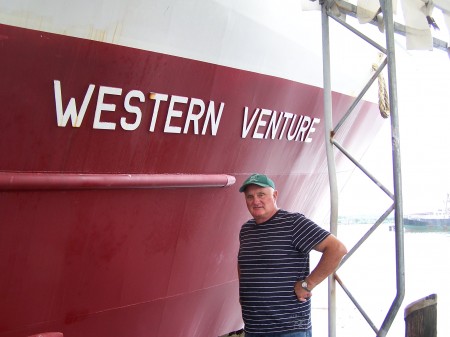
A Question that Demands a Better Response Than What Was Recieved. – The Free Press
This second writing for the Free Press finds me at a place that forces me to revisit my article for the First Edition.
things-are-lookin-pretty-good-for-the-predators-whats-a-poor-cod-fish-to-do-the-free-press
The New England Fishery Management Council began its three day meeting in Plymouth Ma on 9/25/2012.
As is typical of bureaucratic meetings, this one was spiked with some, at times, semi excitement, and threats.
The New England Fishery Management Council approved a motion to allow groundfishermen access to large areas off-limits to fishing.
Study: Fraud growing in scientific research papers
WASHINGTON — Fraud in scientific research, while still rare, is growing at a troubling pace, a new study finds. A review of retractions in medical and biological peer-reviewed journals finds the percentage of studies withdrawn because of fraud or suspected fraud has jumped substantially since the mid-1970s. In 1976, there were fewer than 10 fraud retractions for every 1 million studies published, compared with 96 retractions per million in 2007.


































